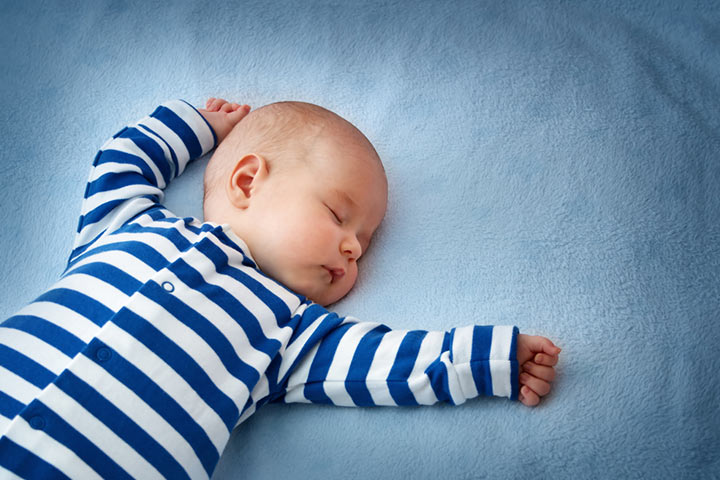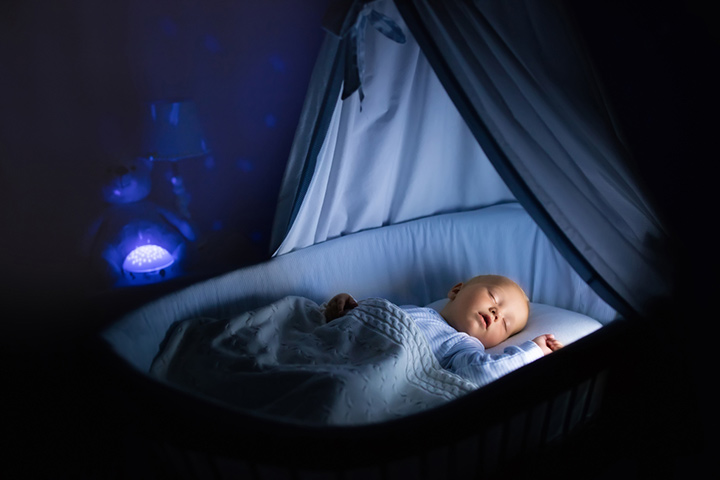
Image: Shutterstock
Believe it or not, newborns sleep through a large chunk of day and night. We know this can be hard to understand since new parents often complain about barely getting enough sleep. The truth is, parents wouldn’t have to deal with sleep deprivation if babies didn’t follow an erratic sleep schedule. Imagine putting your baby to sleep in the evening and going back to the crib only in the morning. Alas, if only things were this simple. If you are concerned or curious about your baby’s sleeping patterns, continue reading our post to get all the info about your little one’s sleep.
The First 3 Months After Birth
Image: Shutterstock
Most infants sleep for about 14 to 17 hours a day for the first 3 months after birth. However, they don’t sleep for several hours at a time. In fact, some babies follow a phenomenon called “day-night reversal” where they end up sleeping more during the day than at night. Though one expects a newborn baby to sleep for 14 to 17 hours, don’t worry if your baby doesn’t fall in this bracket. Some babies get by with just 11 to 13 hours of sleep while others prefer to sleep for 18 to 19 hours in a 24-hour day (1).
3 To 6 Months Of Age
Image: Shutterstock
After the initial months of your baby’s birth, you are edging towards a more stable sleep schedule, though getting a full 8 hours of sleep might be a distant dream. A 4-month-old baby will sleep for about 12 to 15 hours including naps. Babies between the ages of 3 to 6 months will be able to sleep for consecutive 5 hours, giving you more time to catch up on your sleep as well (2).
6 To 9 Months Of Age
Image: Shutterstock
Yay! Now that your baby is 6 months old, he/she will sleep a lot more at night than before. And since babies at this age group don’t require nighttime feedings anymore, they will be able to get most of their sleep during the night with occasional naps during the day. This will also allow you to catch up on your sleep during the night as you won’t be interrupted by your baby anymore (3).
Here’s How You Can Help Your Baby Sleep
Image: Shutterstock
Sleep deprivation can be considered as a rite of passage for new parents. Though this phase will soon fade out as your baby settles into a solid sleep schedule, there are a few things you can do to help your baby have safe and sound sleep (4).
- Follow a good bedtime routine. Overstimulation may decrease the chances of your baby falling asleep. To create a peaceful routine before bedtime, you can try singing, cuddling, or reading to your baby in a quiet, dimly lit room.
- A pacifier may be helpful. If your baby is finding it hard to fall asleep, consider offering a pacifier. Pacifier has also been known to reduce the risk of Sudden Infant Death Syndrome (SIDS).
- Respond to your baby’s cries. Some babies tend to cry or make a fuss before falling asleep. A little assurance and words of comfort might be all they need during this time.
- Babies should be placed on their backs when you put them down for sleep instead of on their side or stomach to reduce the risk of SIDS (5).
- Use firm bedding. Make sure that your baby’s bedding is firm and only covered with a snugly fit blanket. Keep the bassinet or crib bare. If there are any pillows, plush toys, bumper pads, or quilts, make sure you take it out before placing your baby for sleep.
Don’t be disheartened if you are finding it hard to put your baby to sleep. It might take a couple of weeks to settle into a routine and understand your baby’s sleep habits. In the initial months after childbirth, try to take short naps during the day whenever your baby sleeps. If you have any questions or concerns about your baby’s sleep, feel free to talk to your pediatrician.
















